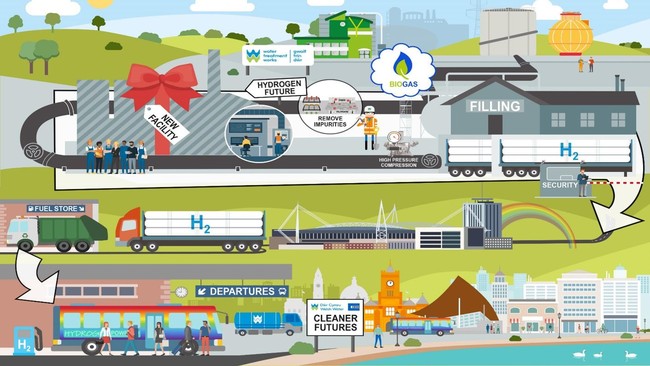None presently but a proposal at the local waste water treatment works could see 2000kg production H2 per day
Consumption not known at present but likely to be minimal. However the Welsh Government is developing a regional Hydrogen strategy around both local production and consumption and has an aspiration to deliver a small Hydrogen busses fleet within the next 5 years. The local gas supplier also has plans to inject/mix H2 into the gas distribution network in the city within 15 years.
a. Solar
c. Hydro
e. Biomass and waste
h. Other
a. Solar
b. Wind
c. Hydro
e. Biomass and waste
h. Other
a. Refueling stations
b. Hydrogen production facilities (e.g., electrolyzers)
f. Hydrogen distribution trucks
d. Other- please specify below
• The local Water company (Dwr Cymru/Welsh Water) has identified an opportunity to extract clean Hydrogen from their waste water treatment process at Rover Way in Cardiff.
• This has potential for 2000kg production H2 per day (enough to fuel 100 buses or equivalent).
• They need to identify a viable off-taker for the hydrogen to justify any investment.
• The City of Cardiff Council are active in decarbonising their fleet using EV’s but there are some constraints (in particular with heavy vehicles, longer distance journeys, and electricity supply for charging) for which Hydrogen might be a better solution.
• CCC commissioned a Hydrogen study (WG funded and conducted by Costain) which looked at supply and demand issues around hydrogen and hydrogen vehicles. In very broad summary, this identified:
o a strong appetite to pursue Hydrogen vehicle options amongst partners and consultees ( especially neighbouring local authorities, bus operators and the SW Police) , and
o A fundamental limitation in the supply chain for hydrogen vehicles, with high prices, low availability and few local/UK operators.
• We are now exploring ways to join these issues and aspirations together with a view to developing a local, low-carbon hydrogen economy:
o The collective interest of all the local public sector consultees represents a potentially large start-up market
